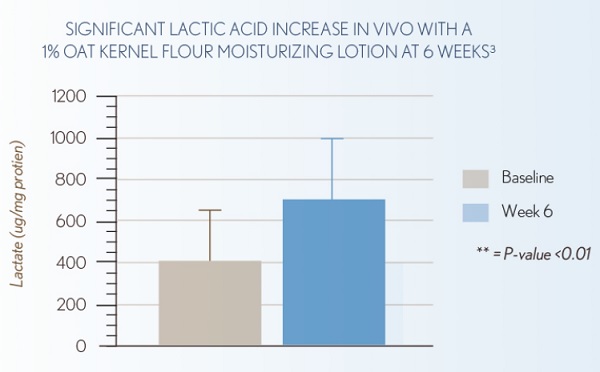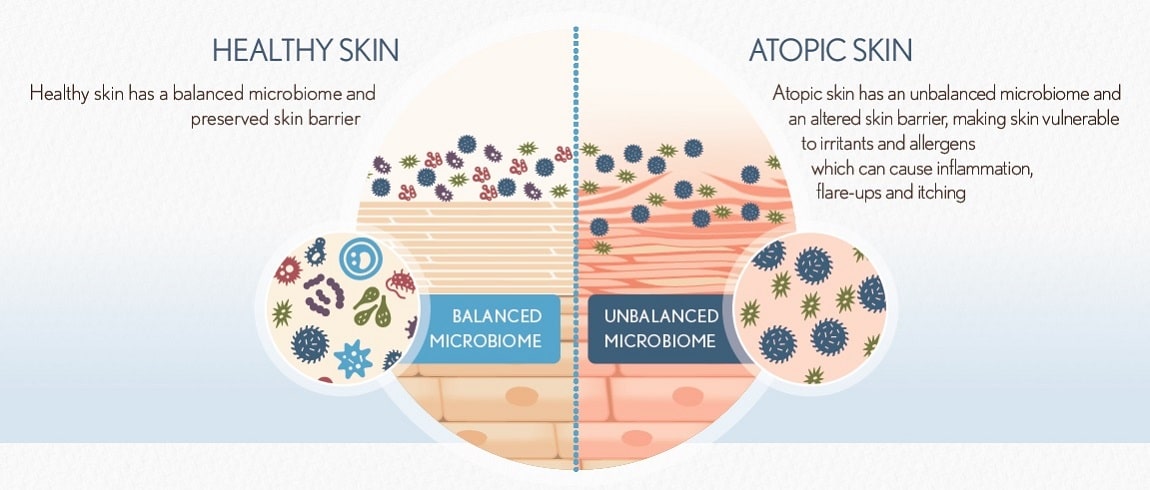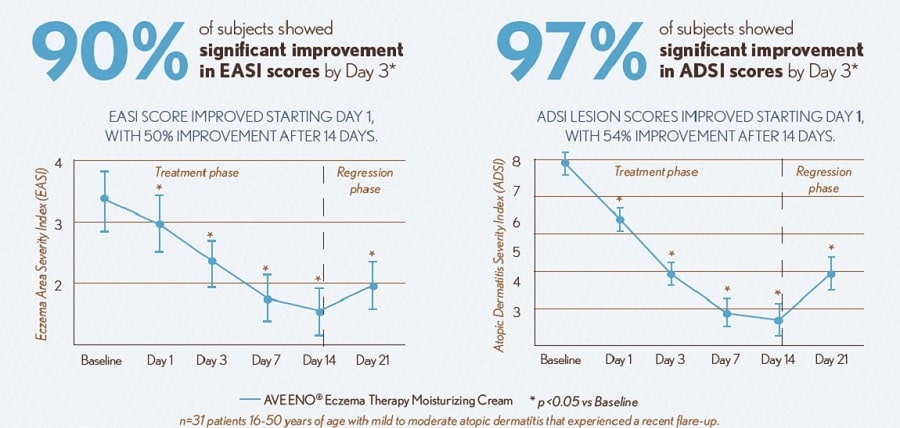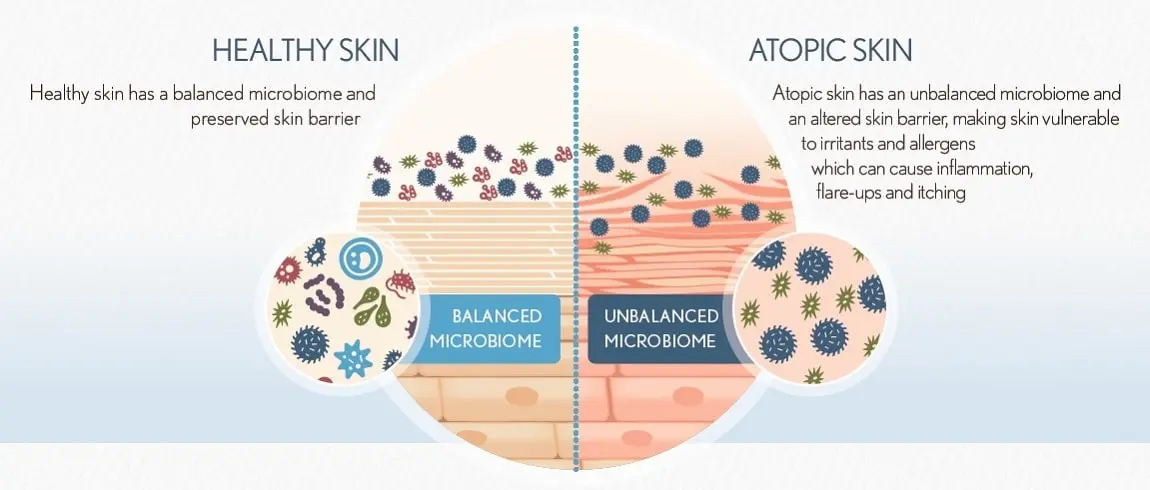What is the skin microbiome?
The skin is the human body’s largest organ and is colonized by a diverse community of billions of microorganisms, including both beneficial and potentially harmful bacteria, coexisting on the skin surface. The types and quantities of microorganisms present are impacted by age, gender, diet, hygiene and environmental factors such as climate and pollution.1 Each person’s skin microbiome is unique.
Research on the skin microbiome has demonstrated that it plays a role in healthy skin. Healthy skin has an intact skin barrier and a balanced microbiome, which typically means a high level of microbial diversity. Patients with certain conditions, including atopic dermatitis and dry, itchy skin, have fragile and altered skin barriers and unbalanced microbiomes. One way to help balance the skin’s microbiome includes the use of prebiotics (often found in carbohydrates or dietary fibers) to enhance the growth of good bacteria.
What are prebiotics?
Prebiotics are food for microorganisms. They are selectively fermented, allowing specific changes both in composition and/or activity in the microflora that confer benefits, like helping microorganisms grow and produce beneficial byproducts. In skin care, prebiotics help to create a healthy environment for the skin microbiome.
Aveeno® scientists have been studying oat for over 60 years and have recently discovered Aveeno® Oat acts as a prebiotic and helps balance the skin’s microbiome.
How does Aveeno® prebiotic oat work?
In addition to rich moisturization and skin barrier benefits, Aveeno® Oat is a skin prebiotic that supports the growth of microorganisms within the skin microbiome2. When metabolized by commensal bacteria, it promotes the growth of S epidermis - an important part of a healthy microbiome that helps reduce pH and increase production of lactic acid.
A healthy skin microbiome prefers a relatively acidic environment (pH ~5.0) which also inhibits growth of pathogens. pH that is too elevated can contribute to impaired skin barrier function. This issue is commonly seen in patients with eczema, where an elevated pH contributes to impaired barrier dysfunction and an environment favouring the growth of S. aureus and S. pyogenes, contributing to dysbiosis of the skin’s microbiome.3 Colloidal oatmeal formula normalized skin pH immediately in atopic skin.

Lactic acid plays an important role in skin health. It is a natural moisturizing factor (NMF) and helps bind water from the atmosphere to keep skin hydrated. It has also been shown to help rebalance skin pH.

The microbiome of atopic skin
Aveeno® research has shown that atopic skin has less microbial diversity with often higher staph colonization, or an unbalanced microbiome, and a compromised skin barrier. This allows vulnerability to irritants which can cause inflammation, flare-ups and itching. Enhancing the skin barrier in patients with atopic dermatitis and improving bacterial diversity could potentially help reduce flares.

In a multicentre, randomized clinical study involving men and women with mild to moderate eczema, subjects using Aveeno® Eczema Care Daily Moisturizing Cream containing Prebiotic Oat experienced significant improvements in eczema symptoms, skin pH and barrier function as well as a dramatic increase in skin hydration, while improving the skin microbiome of lesional skin in 24 hours4. Improvements in EASI scoring and microbial diversity were sustained even after the cream was discontinued for a full week.

The microbiome of itchy, dry skin
The ecosystem of itchy, dry skin is fragile; the skin barrier can be compromised, and the microbiome is more prone to becoming quickly out of balance.
In a single centre, randomized clinical study involving women with dry skin with itch, subjects using Aveeno® Skin Relief Moisturizing Lotion containing Prebiotic Oat experienced significant improvements in itch, barrier function as well as a dramatic increase in skin hydration after only 1 day, while improving the skin microbiome within two weeks. Improvements in itch were sustained even after the lotion was discontinued for a full week.



References:
1. Grice EA, Segre JA. The skin microbiome. Nature reviews Microbiology. 2011;9(4):244-253.
2. In vitro data
3. Panther 2015 J Clin Med
4. Effects of topical lotions on the atopic dermatitis skin microbiome and associations with itch and skin barrier function. Johnson & Johnson Consumer Inc. poster presentation at the 76th Annual Society for Investigative Dermatology (SID) Meeting: April 26-29, 2017; Portland, OR, USA.
5. Grice EA, Kong HH, Conlan S, et al. Topographical and temporal diversity of the human skin microbiome. Science. 2009;324:1190-2.
6. Gallo RL, Nakatsuji T, Microbial symbiosis with the innate immune defense system of the skin. J Invest Dermatol. 2011;131(10):1974-1980.
7. Stamatas GN, Capone K. New findings and the impact of infant skin microbiota on product development. Cosmetics and Toiletries. 2014;129(2):54
